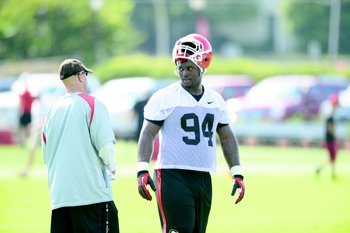Kramer: UGA football arrests becoming the norm
Published 9:51 pm Tuesday, March 18, 2014

- ATHENS - John Taylor during Georgia's fall camp on August 1, 2013 at the Woodruff Practice Fields. (Dean Legge/Fox Sports NEXT)
You’ve got to wonder if Steve Spurrier woke up and enjoyed a hearty chuckle on Tuesday morning.
The South Carolina coach, who prides himself on personifying a Darth Vader-esque role to Georgia, has oft critiqued the Bulldogs athletic program for consistently facing offseason arrests and/or suspensions to football players, which – more often than not – results in an early season suspension.
The streak continued to four years on Monday night when four Bulldogs – safety Tray Matthews, linebacker James DeLoach, defensive lineman Jonathan Taylor and Uriah LeMay – were booked on theft by deception charges stemming from “basically double-dipping” 11 student tuition checks drawn from the UGA Athletic Association, according Marc Weiszer, my former colleague and mentor at the Athens Banner-Herald who first broke the story.
The checks, according to Weiszer, were each in the amount of $71.50, which totaled to $786.50. Because the value of each is under $500, the charges were misdemeanors. Matthews faces three, and Taylor and DeLoach each face two. LeMay, who faces four charges, allegedly took discarded checks from a roommate and attempted to cash and/or deposit them, unlike the other three players booked.
The news was first reported close to midnight on the eve of Georgia’s first spring practice, creating an unwanted distraction in a spring that will be bulked with defensive competition with the addition of new coordinator Jeremy Pruitt and a horde of new assistant coaches.
In digesting this information – which seems to annually surface on the offseason docket – one can’t help but ponder on the character of Georgia. Arrests from drugs, fights, or any other extraneous charges, seem to have become the norm.
Having sat in nearly every press conference Mark Richt conducted over the past two seasons, I’ve observed the 14-year head coach address them like they’re nagging gnats. He dances around the subject and rarely gives definitive answers unless the matter has already been reported.
Take an instance in the spring of 2012 when future 1st round draft pick Alec Ogletree and All-American Bacarri Rambo were reportedly suspended for failed drug tests. Richt released a statement to the media three minutes before walking into the media center that vaguely talked about a “process” that Georgia takes to punish players for violating policies.
The coach then opened his press conference saying: “I don’t know if you all have seen our handout but you might read it because you’ll probably hear it repeated again if you ask the right questions. … We’ve got our guidelines, we’ve got our policies. There’s certain things we’ve got to do when we’re taking care of business, and that’s what we’re talking about,” Richt said when asked if he could confirm the Rambo-Ogletree suspensions.
The same was the case when Richt addressed the media on Wednesday, when he told reporters: “I would just say there’s always a process that I go through before I make a decision. Sometimes it happens rapidly and sometimes it doesn’t. I’m not going to say anything other than if there’s something I need to report to everybody, I will.”
Now, you can’t blame Richt for wanting to avoid the issue if possible. He’s there to coach football, not string the media with off-the-field stories – which can be perceived as distractions.
Yet this column isn’t intended to indict Richt or his methods. He’s been in Athens for 14 years for a reason: 126 wins, two conference titles while not once missing a bowl game.
The longest tenured coach in the SEC is simply surviving in a cut-throat, dog-eat-dog world of college football.
In speaking with a Florida State fan on Tuesday’s arrests, his first comments were: “This all falls on Mark Richt. How can you recruit a guy that makes a decision that stupid?”
Probably because someone else would.
In fact, of the four arrested, three received official offers from FSU.
Now, I can’t blame the Seminoles disciple for his immediate lamentation – because he’s quite the well-rounded college football guru. But sometimes fans have a knack for conveniently pointing the finger. We’ve all fallen victim to this detracting mishap.
Much of the off-the-field headaches for Georgia stem from stiffer policies than most SEC schools, particularly in the drug testing realm. They also emanate from a strong-willed, no-BS law enforcement in the form both the University and Athens Police Departments. Those two entities are there to catch and indict criminals – regardless if it affects the local team’s success.
What’s worse is that this demeanor regrettably seems scare among big-time college football towns.
Trek to Tallahassee and you encounter a police squad that takes seven months to report a rape to the state attorney if it involves a star Seminole. Keep in mind this is after the alleged victim ignored police heeds that “Tallahassee was a big football town and the victim needs to think long and hard before proceeding against him because she will be raked over the coals and her life will be made miserable.”
In Oxford, Miss., if you’re a top flight prospect, the only form of law enforcement you have to dodge from nearly beating a man to death is a lawsuit from the victim’s lawyers (Ole Miss players Robert and Denzel Nkemdiche were not charged for an incident involving the violent assault of one Matthew Baird, who accused the pair of knocking him unconsious during a fraternity party).
The UGA Athletic Assocation initially raised the red flag on the four players arrested on Tuesday, because in Athens, developing character trumps developing talent.
“It’s just like anybody who’s a parent, if one of your children do something they’re not supposed to do,” Richt told reporters on Wednesday. “You know you told them not to do it but they do it anyway. Some of them learn by watching; some of them learn by doing. But if one of your children makes a mistake, it hurts. It hurts. But then you’ve got to be a responsible parent and you’ve got to discipline them. You’ve punish them in some way. You punish, you educate and you love them.”





